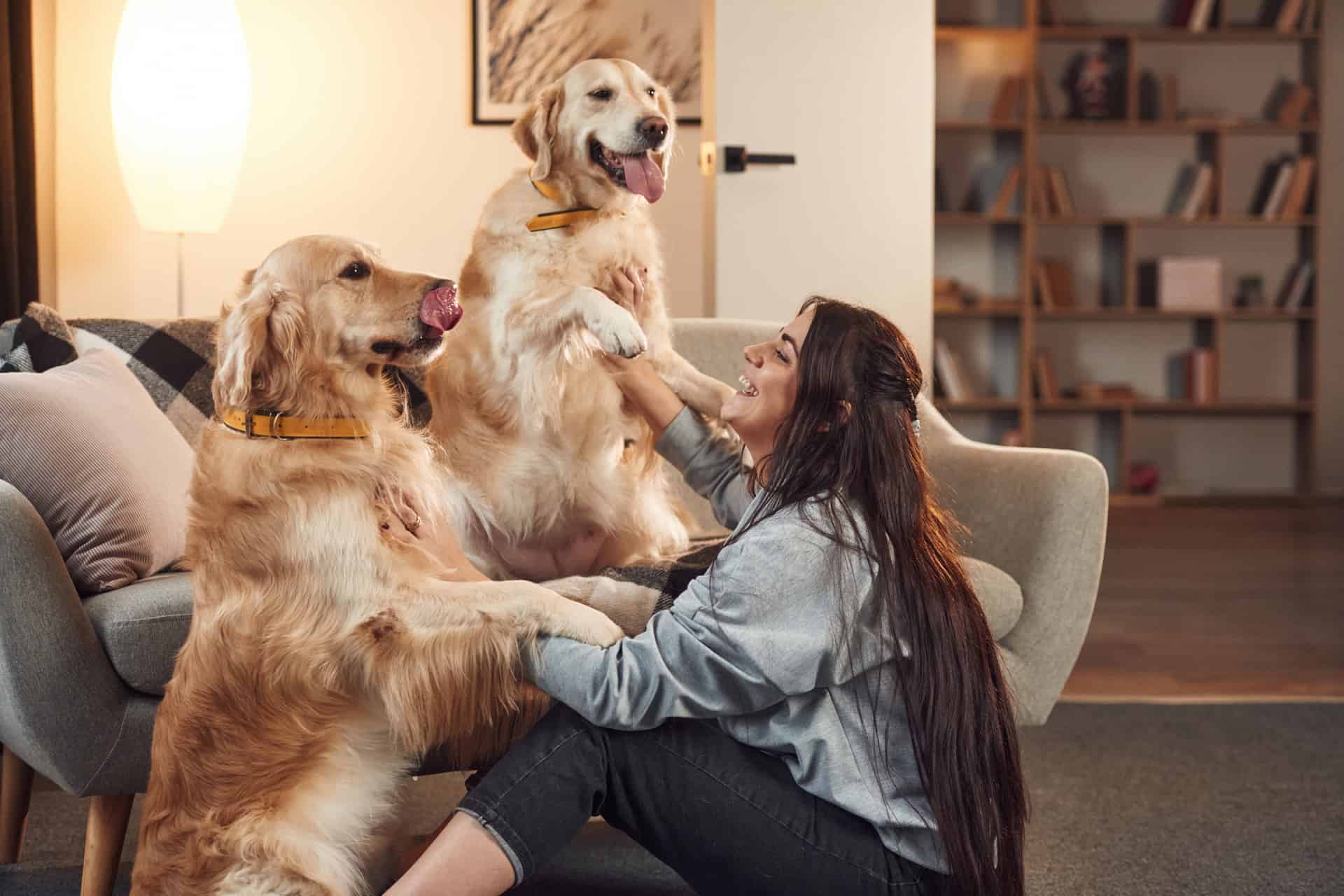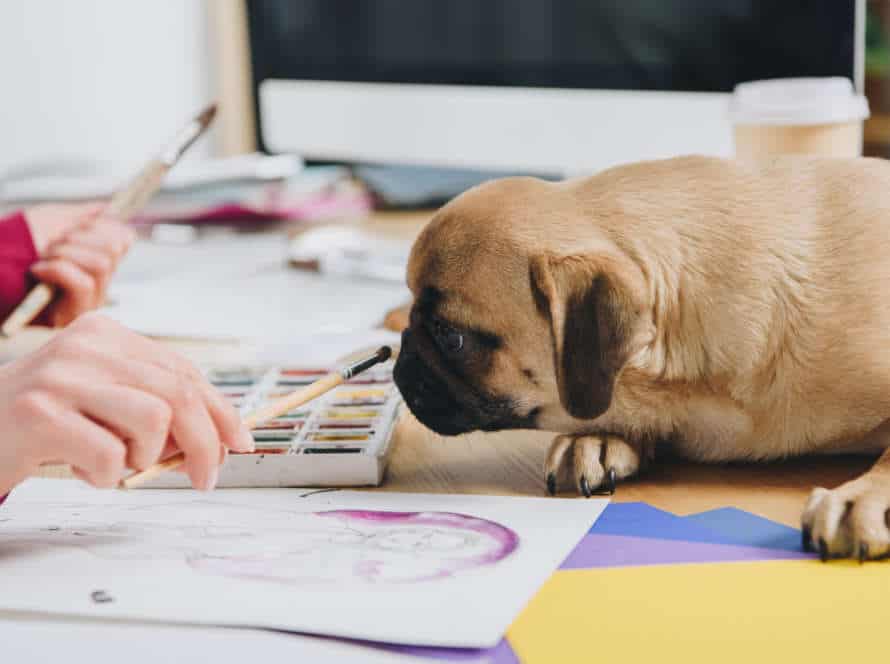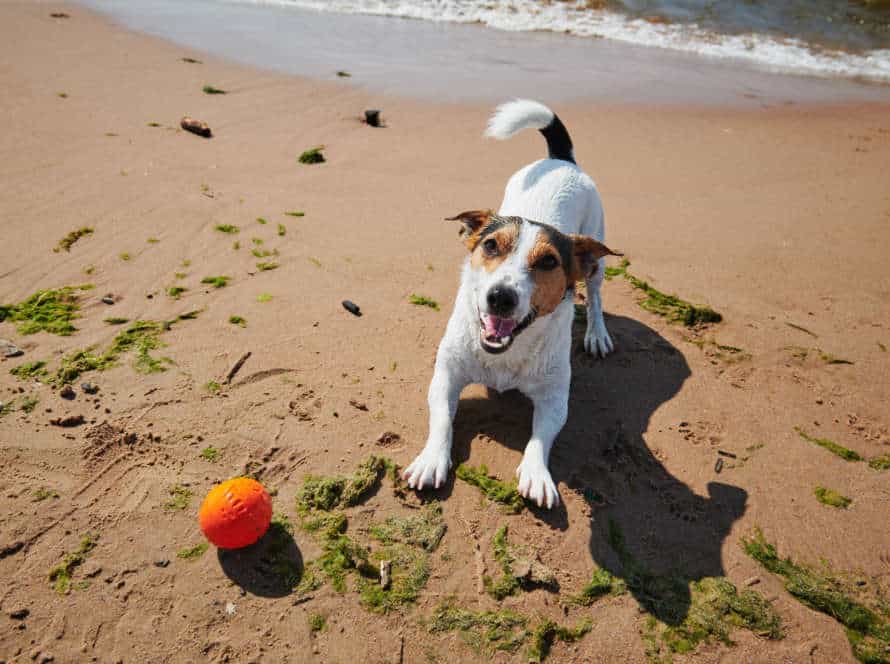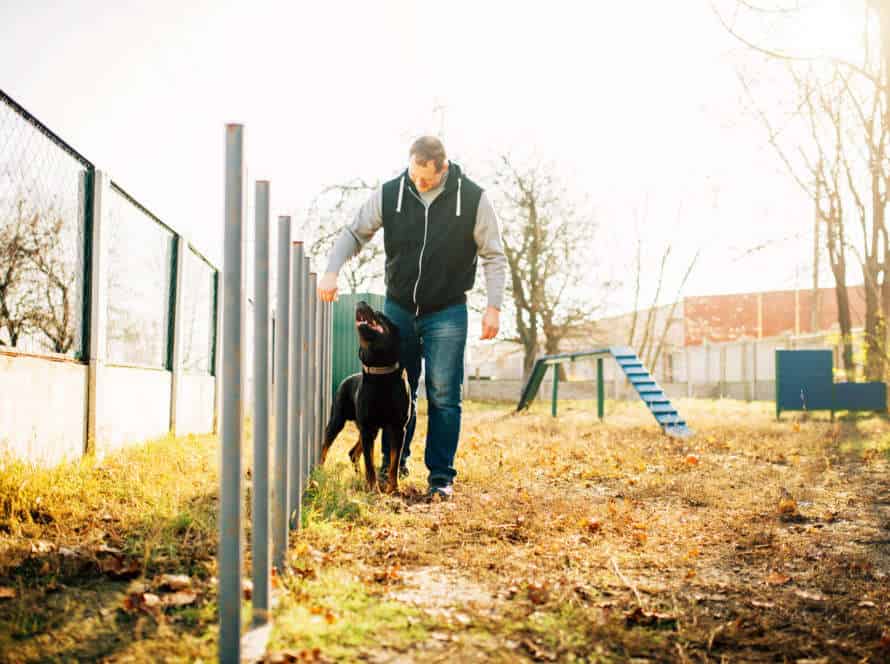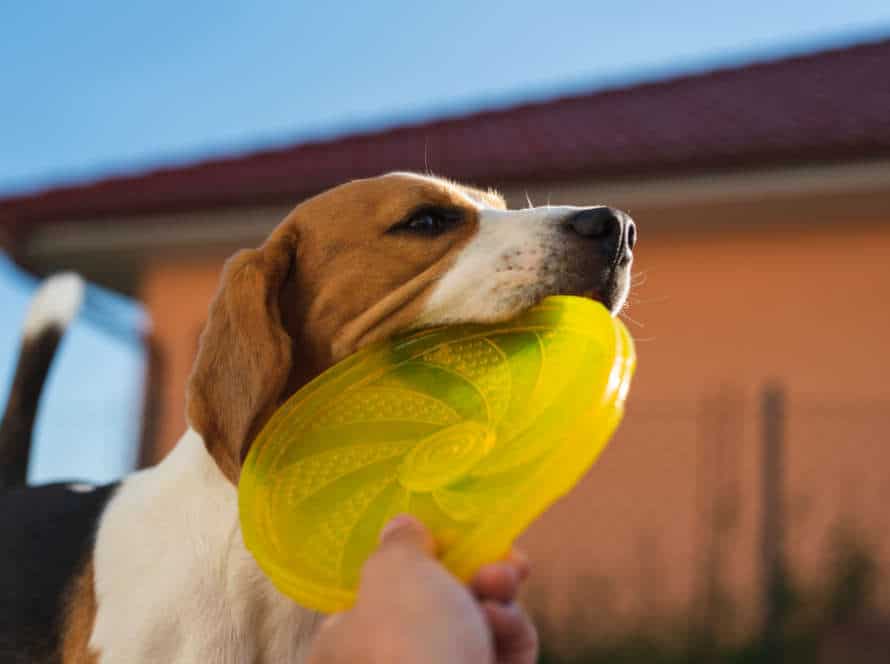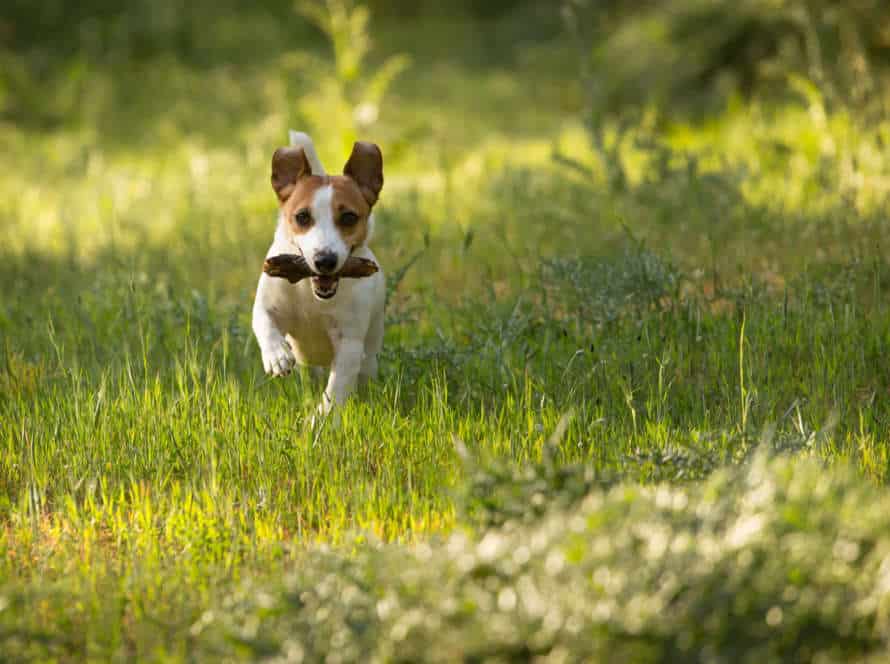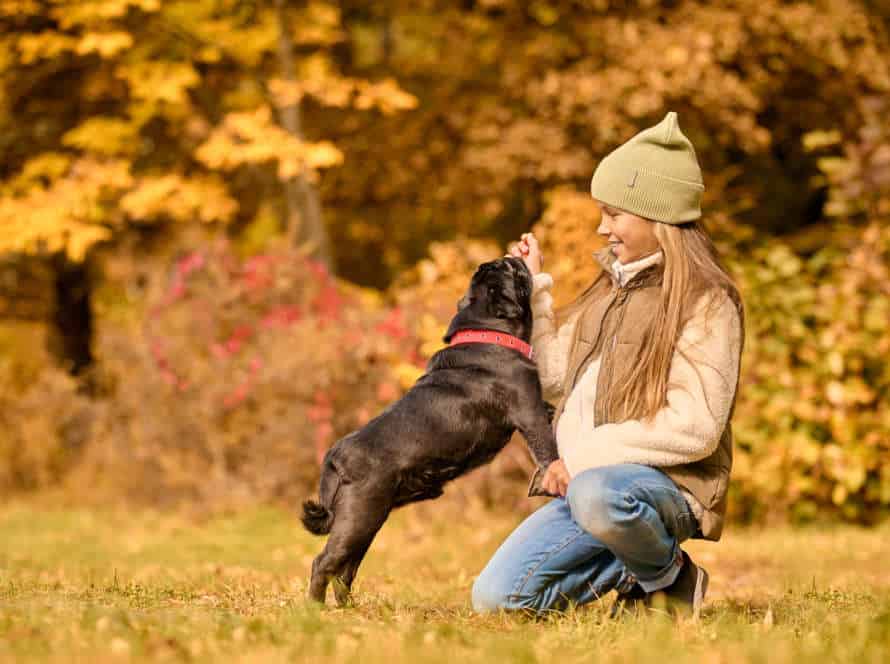Playtime for Behavior Modification: Redirecting Energy Positively
Playtime can help modify pet behavior. Through interactive play, energy can be directed positively, reducing destructive behaviors and promoting mental and physical health.
Here are tips to incorporate playtime:
- Choose toys that activate your pet’s senses and get them moving, like puzzle toys, fetch toys, and interactive toys with treats.
- Set aside daily playtime as a predictable part of their day.
- Playtime can reinforce good behavior, and steer bad behavior elsewhere. For instance, if your pet is being destructive, give them a chew toy during playtime.
- Vary the intensity and length of playtime according to your pet’s age, breed, and physical condition.
By making playtime part of behavior modification, you can give your pet a positive way to release energy and improve their overall well-being.
Understanding the Importance of Playtime for Dogs
Playtime is essential for a dog’s life, especially if they’re being trained. It gives them a way to use their energy in positive ways. Plus, it can help modify behavior. How? Well, playtime can be used as a reward for good behavior! So, let’s take a closer look at how this works.
Benefits of Playtime for Behavior Modification
Playtime is a must for dogs! It has an impact on their behavior and health. It’s great for exercise, burning off energy, mental stimulation, and developing social skills. Here are some of the ways it helps with behavior modification:
- Positive Redirection of Energy: Dogs with too much energy can become aggressive and destructive. Playtime gives them an outlet and prevents this.
- Socialization: Playing with other dogs or people can help reduce anxiety and fear.
- Obedience: Playtime helps teach new skills and commands, leading to better obedience and training.
So, make sure to give your pup regular playtime – it’s so important!
Significance of Playtime in Reducing Anxiety and Stress in Dogs
Playtime is essential for a pup’s life. It provides fun, reduces stress and anxiety, and encourages good behavior. It also redirects energy in a positive way.
Games like fetch, tug-of-war, and hide-and-seek give dogs an opportunity to exercise and release energy. This has a calming effect.
Interactive toys and puzzles keep them mentally engaged and entertained.
Playtime is an excellent way to form a bond with your dog and encourage healthy behavior. Make sure to provide playtime daily for a happy and healthy pet!
Impact of Playtime on Positive Reinforcement Training
Playtime is essential for positive training of dogs. It gives them a chance to expend energy and learn in an enjoyable, rewarding way.
Here are three benefits:
- Redirects energy positively – playtime helps dogs get rid of their energy in a positive way, meaning they won’t engage in behaviors like digging or destructive chewing.
- Reinforces positive behaviors – when playtime is included in training, dogs are more likely to obey commands and understand that good behavior = fun activities.
- Strengthens bonds – playtime offers an opportunity to bond with your dog, making training more successful.
Including playtime in training is key for good behavior and a strong bond with your pup!
Engaging Dogs in Interactive Playtime
Interactive playtime with your pup can be a great way to modify their behavior. Play can challenge and redirect any negative energy into something positive. It also builds trust and reinforces desired behaviors. Let’s explore how interactive playtime can benefit both you and your pup!
Types of Interactive Toys and Activities
Interactive activities and toys are great for dogs. They keep them active, physically and mentally. Plus, they can help modify their behavior. Here are some of the types:
- Puzzle toys: Challenge a pup’s mental ability and problem-solving skills. Get to the treat or toy inside!
- Tug toys: Perfect for interactive playtime. Plus, helps build jaw strength and bond with owner.
- Fetch toys: Ideal for those who love to chase and bring back balls, sticks, and frisbees.
- Agility: Activities like agility courses or jumping through hoops keep them physically fit, stimulated, and exercised.
- Play-based training: Play focuses on reinforcing good behavior, following commands, and building a healthy relationship. Toys can distract them, act as a reward, and redirect their energy positively.
Choosing the Right Toys for Dogs Based on Size, Breed, and Energy Level
To make sure your pup is safe, and to give them physical and mental stimulation, you need to pick the right toys. It depends on a few things, like size, breed and energy level. Here’s what you should know:
- Size: Small dogs need lightweight toys; larger ones need stronger ones to bite and chew. Avoid choking hazards!
- Breed: Working breeds like puzzle toys and treat dispensers; herding breeds like chasing and retrieving objects.
- Energy level: High-energy dogs need physical activities like frisbees, balls, and tug ropes. Low-energy dogs need puzzles and interactive toys.
Always supervise your dog when they’re playing, and switch out broken toys to avoid accidents.
Positive Reinforcement Techniques for Interactive Playtime
Positive reinforcement is a great way to modify behavior when you’re playing with your furry friend. Here are some tips for positive reinforcement during playtime:
- Treats! Reward your pet with a treat after they do something good.
- Verbal praise! Give them audible cues, like “Good boy/girl!” or “Well done!”
- Interactive toys! Puzzle games and fetch toys will keep your pup entertained.
- Consistency! Reward positive behavior each time, and have a structured playtime plan.
Pro Tip: Positive reinforcement can be fun for both of you! Get creative and have a blast!
Incorporating Regular Exercise into Playtime
Exercising regularly can be a great way to change behaviour for the better. Exercise helps a dog to use up energy, and also gives their mind something to do. It can be especially useful when it comes to making exercise part of playtime. That way, energy can be used in positive ways. Let’s chat about how to do that.
Benefits of Regular Exercise for Dogs
Exercise is essential for a pup’s wellbeing – physical and emotional. Adding it to playtime brings about major benefits. Play isn’t just for having fun; it also helps with behavioral development, as it’s an excellent way to direct a dog’s energy positively. Here are some rewards of regular exercise for dogs:
- Weight & Health: Exercise helps keep weight healthy and stops obesity-related issues such as joint problems, diabetes and heart disease.
- Mental Stimulation: Playtime increases mental and emotional health, lowers stress and anxiety, and helps with aggression and behavior issues.
- Stronger Bond: Playing with your pup reinforces trust, companionship and the relationship between you two.
- Training Aid: Exercise helps show calm, focused behavior and helps with hyperactivity and aggression.
Adding regular exercise to playtime has a holistic effect on the dog’s well-being, encouraging healthy behavior and a cheerful attitude.
Creating an Exercise Plan for Dogs Based on Age and Ability
Exercise is key for keeping your pup healthy. But be sure to plan out a routine that’s suitable for their age and abilities. Here are some tips to help you:
- Consider age & activity level. Puppers might do well with fetch, while older doggos may prefer a walk.
- Do at least 30 minutes of exercise each day, split into sessions.
- Vary the type of exercise. Hiking or swimming can stimulate muscles & provide mental stimulation.
- Playtime can be used to modify behavior. Use positive reinforcement to redirect energy & train.
- Pro Tip: Talk to a vet first. They can provide insights & suggest an exercise routine that fits your pup’s needs.
Combining Exercise and Training for Positive Behavior Modification
Combining exercise and training is a great way to modify your pet’s behavior. Plus, it will help their health and wellbeing. Use playtime to exercise your pet. Make a schedule for playtime. Add activities that involve exercise and training such as fetch or basic commands. Give treats or praise for good behaviour. Change up playtime activities to keep your pet interested. Regular exercise and playtime are important to promote positive behaviour, reduce stress and improve their quality of life.
Avoiding Common Mistakes in Playtime
Playtime is a useful technique for altering behaviour. It can help transform a child’s energy into something more positive and boost their self-confidence. But, it’s essential to be aware of some mistakes that can happen during playtime. This article will discuss several blunders to prevent when utilizing playtime for behaviour modification.
Overstimulation and the Risk of Injury
Playing can be risky for both pets and owners. To have a fun, safe time, avoid the following:
- Pulling toys hard. This can hurt necks and backs. Gentle is best.
- Letting pets jump. Both people and animals can get hurt. Stick to activities that keep feet on the ground.
- Not noticing when pets are tired. If panting or slowing down occurs, take a break.
Try fetch, puzzle toys, or training for a productive and positive playtime!
Setting Boundaries and Encouraging Healthy Play
Playtime is key for your pet’s wellbeing. Establishing boundaries can make it healthy. Here’s how:
- Supervision: Keep an eye on your pet’s behaviour and step in if needed.
- Clear Boundaries: Set clear boundaries early with positive reinforcement.
- Age-appropriate toys: Choose toys suited to your pet’s age.
- Appropriate time: Limit playtime to 30 minutes or less.
- Redirecting Energy: Add training, walks and other activities to redirect energy positively.
Pro tip: Make sure playtime is fun, interactive and a bonding experience with your pet. Enjoy it while setting boundaries!
Identifying and Addressing Unwanted Behaviors During Playtime
It’s important to take care of unwanted behaviors during playtime. Aggression, possessiveness and loud barking can spoil playtime. Here are some tips to redirect energy in a positive way:
- Observe your pup’s body language and behavior carefully.
- Look out for signs of distress or aggression.
- Interrupt any negative behavior straight away by calmly pointing to a fun toy or activity.
- Reward your pup’s good behavior with treats and words of praise.
- Don’t yell or do physical punishment – this can create bad associations with playtime.
- Train your pet and use behavior modification techniques to sort ongoing issues.
With patience and consistency, you’ll create a safe playtime for both you and your pup.
Tips and Tricks for Successful Playtime and Behavior Modification
Incorporate playtime into your child’s daily routine! This can direct their energy in a positive way. It can even help with creative thinking and problem solving. Plus, it can aid in learning better behavior. Here are some ideas for successful playtime and behavior modification:
Using Treats and Verbal Praise for Positive Reinforcement
Use treats and verbal praise to positively reinforce your pet, especially dogs. Here’s how:
- Give small treats they love.
- Praise and reward good behavior right away.
- Be consistent with rewards for desirable behavior.
- Gradually reduce treats and verbal praise as your pet learns the behavior.
- Exercise and playtime can help direct energy positively.
Pro tip: Positive reinforcement not only encourages good behavior, but also strengthens the bond between you and your pet.
Incorporating Playtime into Daily Routine
Include playtime in your everyday routine. It’s a fun and easy way to help change your child’s behavior. Follow these tips:
- Set aside a time each day when they have the most energy.
- Let them pick the activity – board game, sport, or toys.
- Take part in the playtime and talk with them.
- Teach them patience, teamwork and good sportsmanship.
- If they have a negative attitude, address it and suggest something positive.
Pro Tip: Playtime strengthens the bond between you and your child and helps their behavior.
Seeking Professional Help for Advanced Behavioral Issues
When it comes to behavioural issues, getting help from professionals is the most effective way to understand the reason and come up with a plan. They can carry out an evaluation and use techniques that have been proven to work.
Positive activities during playtime can also help. Here are some tips:
- Make a routine for playtime that has both outdoor and indoor activities.
- Speak positively to motivate your child.
- Include activities that use the senses, like finger painting and slime making.
- Set boundaries and expectations.
Most importantly, have fun and enjoy the moment!
Frequently Asked Questions
Q: What is the best way to redirect a child’s energy positively during playtime?
A: Engaging the child in physically active games and activities is an excellent way to redirect energy positively during playtime. This could involve outdoor games, sports, dance or yoga for children.
Q: How does active playtime help in behavior modification?
A: Active playtime helps to improve children’s health, control aggression, and develop positive social behavior. Also, it provides an alternative to negative behaviors such as substance abuse, alcoholism, and anti-social behaviors.
Q: What are the benefits of using playtime as a tool for behavior modification?
A: Playtime can greatly enhance a child’s physical, emotional, and social development. By using playtime as a tool for behavior modification, children can learn teamwork, develop self-esteem, and improve their emotional regulation.
Q: What are some examples of positive playtime activities?
A: Positive playtime activities can include building blocks, coloring, singing, or storytime. Additionally, outdoor activities such as gardening, cycling, or exploring nature can also provide positive benefits.
Q: How can parents ensure that their children’s playtime is beneficial for their overall development?
A: Parents can ensure that their children’s playtime is beneficial by monitoring the activities and games, providing opportunities for engaging in active playtime, and encouraging positive social interactions with other kids.
Q: Can playtime be used as a way to improve a child’s academic performance?
A: Yes. Playtime enhances cognitive and language development, which in turn has a positive impact on academic performance. Incorporating games that involve problem-solving, reasoning, and critical thinking can improve a child’s academic skills.

